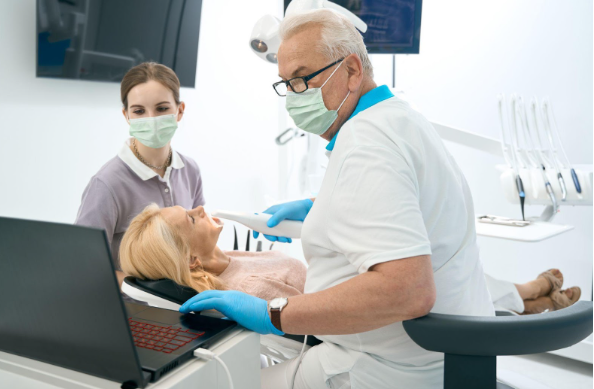
When you think about eating disorders, what often comes to mind are the serious health issues they cause, such as malnutrition, heart problems, and mental health struggles. These are all important to consider, and anyone struggling with an eating disorder should seek proper professional care from a qualified mental health professional with a relevant qualification, such as Felician University's online Masters in Counseling Psychology.
Having said all that, one aspect of eating disorders that is sometimes overlooked is the impact they can have on dental health. Teeth and gums can suffer significant damage from the behaviors associated with disorders like anorexia, bulimia, and binge eating disorder. Understanding this connection is crucial for recognizing the full scope of these conditions and addressing them comprehensively.
What is an Eating Disorder?
Eating disorders are complex mental health conditions that involve unhealthy relationships with food and eating habits. They include;
Anorexia Nervosa
Characterized by an intense fear of gaining weight and a distorted body image, leading to severe food restriction and weight loss.
Bulimia Nervosa
Involves cycles of binge eating followed by purging behaviors, such as vomiting or excessive use of laxatives, to prevent weight gain.
Binge Eating Disorder
Marked by recurrent episodes of eating large quantities of food, often quickly and to the point of discomfort, without subsequent purging behaviors.
Each of these disorders can have a unique and severe impact that is devastating for individuals — this can include effects on oral health.
Signs and Symptoms in Oral Health
If a dentist notices signs of potential eating disorders, they may inquire about the patient's eating habits and overall health. It's essential to approach this topic with sensitivity and care, as eating disorders are deeply personal and can be challenging to discuss. Dental professionals can play a crucial role in identifying eating disorders, as the oral symptoms are often early indicators of these conditions.
Tooth Erosion and Cavities
One of the most severe dental issues associated with eating disorders, particularly bulimia nervosa, is tooth erosion. Frequent vomiting exposes teeth to stomach acid, which is highly corrosive. This acid wears away the enamel, which is the hard, protective outer layer of the teeth, leading to erosion. Once the enamel is eroded, teeth become more susceptible to cavities and decay. This can result in increased tooth sensitivity and pain.
Gum Disease
Malnutrition and poor oral hygiene, which are common in individuals with eating disorders, can lead to gum disease. Gingivitis, the early stage of gum disease, involves inflammation and bleeding of the gums. If left untreated, it can progress to periodontitis, a more severe form of gum disease that can cause gum recession and tooth loss.
Dry Mouth
Dehydration, a common consequence of anorexia and bulimia, can lead to dry mouth (xerostomia). Saliva is essential for maintaining oral health as it helps wash away food particles and neutralizes acids produced by bacteria. A lack of saliva can increase the risk of tooth decay, gum disease, and oral infections.
Sore and Swollen Glands
Bulimia can cause the salivary glands, especially the parotid glands, to become swollen and sore. This swelling is often due to the repeated act of vomiting and can lead to discomfort and a noticeable change in facial appearance.
Oral Infections
Nutritional deficiencies associated with eating disorders can impair the immune system, making the body more vulnerable to infections, including those in the mouth. Oral thrush, a fungal infection, and angular cheilitis, which causes cracks at the corners of the mouth, are common issues.
Dental Care and Recovery
Taking care of dental health is a key part of recovering from eating disorders. Regular dentist visits can be beneficial to monitor issues like enamel erosion, cavities, and gum disease. Dentists can offer tips for protecting tooth enamel, looking after oral health, and caring for sensitive teeth. This could include anything from recommending rinsing with a mouthwash instead of brushing after vomiting, to using specific toothpastes for sensitive teeth, staying hydrated and chewing sugar-free gum or sucking on sugar-free candies to help with dry mouth, or recommending medications to boost saliva production.
A balanced diet full of essential vitamins and minerals supports both oral and overall health. Nutritional counseling can guide individuals toward healthier eating habits. Since eating disorders are complex, recovery often involves psychological support through therapy and counseling to tackle underlying emotional and mental health issues. This well-rounded approach can make a big difference in helping those affected by eating disorders regain their health and wellbeing.
Path of Prevention and Empowerment
Preventing eating disorders and promoting dental health requires a collaborative approach. Educating young people about the dangers of eating disorders and the importance of oral health can make a significant difference. Schools, parents, and healthcare providers can work together to:
1) Promote healthy body image and self-esteem
2) Encourage balanced and mindful eating habits
3) Highlight the importance of regular dental care
4) Foster open communication about mental health and wellness
Reducing Negative Impact
The link between eating disorders and dental health is a stark reminder of how these conditions can impact the body in unexpected ways. Recognizing and addressing the dental health consequences of eating disorders contributes towards a more holistic approach to treatment and recovery. By working together, dental professionals, healthcare providers, and communities can support individuals on their journey to better health, both mentally and physically.
Awareness, education, and compassionate care are key for making a positive difference in the lives of those affected by eating disorders. These efforts can help reduce the ongoing negative impacts, such as poor dental health, that these individuals often experience.
If you or someone you care about need immediate support; contact the Suicide & Crisis Lifeline on 988, or text the Crisis Text Line (text HOME to 741741). Both services are free and available 24/7. The deaf and hard of hearing can contact the Lifeline via your preferred relay service or dial 711 then 988. All calls are confidential.